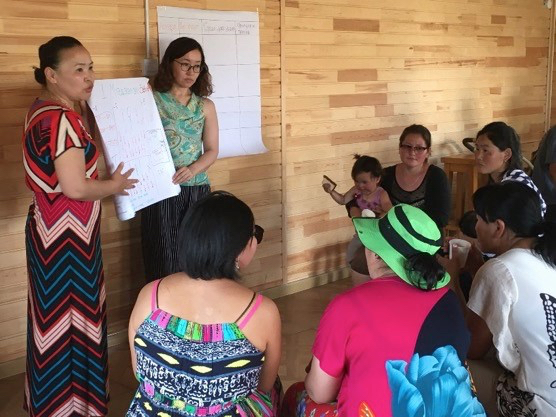PCC joined the global WOLTS project seven years ago, as we were interested in its focus on gender and herding communities, especially those affected by mining, but we had no idea what a learning journey it would be! Our organisation focuses on participatory, community-led conservation, and we have worked with local groups all over the country. However, like many Mongolians, my colleagues and I had assumed that gender was not really a big issue in our country. After all, equal rights for women were enshrined in our constitution back in the 1920s. This project opened my eyes, particularly to gender inequality in land administration and governance, especially for women-headed households. We also became aware that there are significant numbers of herder men who were left behind by the rapid economic and social changes in Mongolia in the 1990s, and who still struggle to be heard in the current system.
Over a number of field trips we selected and started to work in three soums – Bornuur, Daranjargalan and Tsenkher. The changes of the past decades since socialism ended were being compounded by massive pressures from mining in these communities, bringing new population and environmental problems to pasturelands that previously had been well managed by local herders.
Using participatory research techniques involving rigorous community feedback, we started to uncover key issues facing herders in Mongolia today. In two of the communities we then gradually developed and tested the WOLTS gender and land champions training programme, watching local herders like Purevdolgor, Tuya and Odgerel transform into leading local advocates for change.
The communities gained confidence in challenging poor mining practices, selecting their own gender and land champions for more intense leadership and legal training. Over time, we saw the champions not only get involved in solving local land issues, but also in tackling other social problems such as gender-based violence, family breakdown and lack of opportunities for younger herders. As herding is central to Mongolian national identity, we really felt we were doing something important for our country.
Our work was validated even further when we were invited by the national land agency, ALAMGAC, to contribute guidance on strengthening gender-equity within ALAMGAC’s participatory land management guidelines, to ensure that women and vulnerable men were included in critical decision-making on local land use. We developed and tested a gender-equity focused consultative process in Dalanjargalan soum. Then we were requested by ALAMGAC to run over 30 online workshops and a face-to-face workshop in the capital, Ulaanbaatar, training over 330 local land officials and 26 national level government land experts in using our guidance on gender during our most recent dissemination phase of WOLTS.
It was this process of dissemination of our work with WOLTS that has left the most lasting impression on me and my team at PCC. In other projects we have worked on, communication and dissemination of findings has rarely lasted for more than a few months – usually just added on at the end of a reporting process.
Within the global WOLTS project, communication was built in from the start, and the dissemination process was strategic, lasting almost two years. Together with our WOLTS partners Mokoro of the UK and HakiMadini of Tanzania, we carefully considered where our work would be of most value, and designed events and methods to reach those people, globally, nationally, locally. Crucially we were doing much of this during the height of the pandemic, so a lot of our work was virtual.
Among the skills we have developed within the WOLTS team are designing engaging webinars, writing blogs, and realising that the people we work with – the local men and women who have become gender and land champions – are the most powerful advocates for change, both within their communities and at national level.
We still struggle to have gender inequality taken seriously by many government officials in Mongolia, but things are changing. Our ‘gender guidelines’ for ALAMGAC (available here in English and Mongolian) mean that there is a lasting legacy for our work. I feel that as we end this phase of WOLTS, the champions and many officials we have met are taking on the principles of inclusive and gender-equitable land governance, and making them their own.
This blog has been simultaneously published as a Mokoro newsletter article with permission of the author.
Narangerel Yansanjav is Executive Director of the Mongolian NGO, People Centered Conservation (PCC), and a senior team member of the global WOLTS project, which is carried out in Mongolia by PCC with Mokoro Ltd, a UK-based not-for-profit organisation. For more information on WOLTS and access to research reports and publications, please visit http://mokoro.co.uk/project/womens-land-tenure-security-project-wolts/

